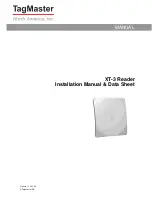
Rev 34.7/3-20
8
MR1611LDC: #35050
To Install (and Remove) the Lift Bar Extension
The lift bar extension must be used whenever the pad frame’s removable sections are attached.
Otherwise, the extended pad frame would strike the lift bail during rotation. The lift bar
extension can be removed whenever the removable sections are not attached to the pad frame.
1) Support the lifter so that hoisting equipment is not required to hold it upright. Make sure the
lifter is supported securely before removing the hoisting equipment hook from the lift bail.
2) Remove the 12 bolts from the lift bar joint and remove the joint couplers.
3) Install the lift bar extension between the upper and lower sections of the lift bar.
4) Install joint couplers at the joints on either end of the lift bar extension.
5) Install and securely tighten the 12 bolts for each of the 2 lift bar joints.
6) To remove the lift bar extension, reverse this procedure.
To Install (and Remove) the Optional Short Lift Bar
If applicable, install the Short Lift Bar directly to the lifter, as described in the preceding section.
However, do
not use the lift bar extension or joint couplers; instead, bolt the Short Lift Bar
securely onto the lower section of the standard lift bar, using the hardware provided.
WARNING: Maximum Load Capacity equals 1,800 lbs [815 kg] when Short Lift
Bar is installed.
To remove the Short Lift Bar, reverse this procedure.
To Install (and Remove) the Removable Sections of the Pad Frame
1) Align one removable section with the center section of the pad frame.
2) Align the bolt holes on each side of the joint where the removable section attaches to the
center section. Insert the 8 bolts for 1 removable section through the bolt holes and tighten
the bolts securely. Make sure the bolt spacers located inside the pad frame’s tubes remain in
place.
3) Remove the male end of the quick connector from the spring
clip on the pad frame’s removable section. Thread the
vacuum hose through the opening for this purpose at the
pad frame joint. Push the male and female ends of the
quick connector together until they lock.
4) Repeat steps 1-3 to install the other removable section of
the pad frame.
5) To remove the pad frame’s removable sections, reverse this
procedure. Move the release ring on the female end of the
quick connector away from the male end to separate the ends.
QUICK CONNECTOR
1) FEMALE END
2) MALE END
Summary of Contents for MR1611LDC
Page 2: ......
Page 38: ...Rev 34 7 3 20 36 MR1611LDC 35050 ...
Page 39: ...Rev 34 7 3 20 37 MR1611LDC 35050 ...
Page 40: ...Rev 34 7 3 20 38 MR1611LDC 35050 ...
Page 41: ...Rev 34 7 3 20 39 MR1611LDC 35050 ...
Page 42: ...Rev 34 7 3 20 40 MR1611LDC 35050 ...
Page 43: ...Rev 34 7 3 20 41 MR1611LDC 35050 ...
Page 44: ...Rev 34 7 3 20 42 MR1611LDC 35050 ...











































